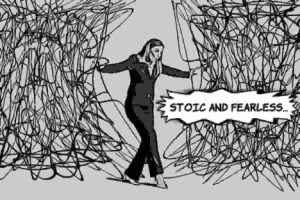A good number of people on Earth flinch. But this reactive impulse is unique to individuals which makes it hard to tell what it means as the semantics differ from one person to another.
Perhaps, you touched someone and they flinched and you’re now wondering what could be behind their somewhat weird reaction to your touch.
Your inquisition can get further fueled if the person shies away or refuses blatantly to tell you why he or she flinches at touches.
Plus, if someone else noticed this in the person, it constitutes you wanting to find out why and what it means. However, I will be discussing in detail all there is about this subject matter and a few more. Stay with me!
3 Possible Meanings When Someone Flinches When You Touch Them?
The meanings behind someone flinching when you touch them depend on the person’s personality and reservations concerning issues like socialization and person-to-person connection.
While flinching can be mostly natural, other factors can add up to the possible meanings of why someone would flinch when you touch them.
Below are a couple of 3 possible meanings of when someone flinches when you touch them.
- It could stem from a behavioral disorder such as an autism
- It could be traced to a traumatic experience in the person’s early childhood if they had any
- It means the person is not used to being touched, perhaps, a result of how they were raised
1. It Could Stem From a Behavioral Disorder Such as an Autism
Certain behavioral disintegrations can compel someone to be repulsive to touching. Disorders like autism come into the picture if we’re to consider this stream of thought as a plausible meaning as to why someone would flinch when you touch them.
Here, we can deduce that the person has anxiety, especially about social cues and interaction.
This anxiety further makes the person reclusive from any form of socialization, thus, making them even funky whenever people get close to them.
This explains why the person would flinch when you touch them…they’re simply reacting naturally to your actions although it is orchestrated by their behavioral disorder.
2. It could be traced to a Traumatic Experience in the Person’s Early Childhood if They Had Any

A person’s upbringing can manipulate their mind into thinking that they don’t need certain things, especially if they got less of what they’re in denial about.
If the person that flinches when you touch them has a record of traumatic experience growing up, they may have a problem settling in for any type of physical contact with people.
Perhaps, the issue has something to do with a case of abuse that occurred in their early years as a kid.
The whole situation makes more sense if you’ve tried talking to the person about their problems and they’re also shy away from making a conversation out of it.
They’re just bugging themselves with the thoughts and it’s making them feel bad about it. Hence, flinching becomes their last resort to make a statement whenever someone wants to come into their space.
This reads meaning into the “why” behind their actions.
3. It Means the Person Is Not Used to Being Touched, Perhaps, a Resultant of How They Were Raised
This is another way to see things if someone flinches when you touch them. This point exposits a possible lack of touch during the parenting phase of the person’s life.
What I intend to establish here is that there’s a possibility that the person didn’t get much touching or physical contact with their parents, guardians, or even relatives. Because of this, they tend to show repulsion when someone tries to get physical with them.
Here, their fear is not lodged in getting hurt, rather, it stems from the fact that physical contact is a tad alien to their body.
They’re used to not getting it, so when they finally do, they find it hard to accept the reality that it is possible making them retract at the instance of being touched by anyone at all.
Usually, in this case, the person is likely to open up to you about their repulsion and this is to enable you to understand why it is hard for them to feel relaxed with you.
Is It Bad If You Flinch Easily?
No, it is not bad if a person flinches easily. This is because flinching is a natural reflex reaction to whatever stimuli your body comes across.
It is how your body reacts to things it is protective of. Flinch to an extent becomes a security alarm system of your body because it reminds you of an intending evasion of your space by another person.
You can flinch to touch, a steady gaze, an over-confident orator, a manipulator who doesn’t know when to stop, and you can even flinch to the elements of weather.
Judging from this angle, there’s nothing wrong with flinching. However, it becomes bad if it stops you from being confident and stoic when you need to.
Equally, when you flinch, you give people the impression that you’re protective or worse, over-protective of yourself which can be bad for your social interaction and growth.
The reason for this is that it could create distrust between you and people, possibly someone with whom you share a mutuality of emotional interest.
What Does It Mean When Someone Never Flinches?
While there is majority of people flinch when they’re touched, looked at, or even brushed over; there are some who never flinch.
This could come off as a surprise if you consider the semantics involved in flinching. But you don’t have to be deeply lodged in confusion and wonderment because I’ve met, seen, and even had conversations with a couple of people who never flinches.
Don’t worry, I will be discussing my findings on what it means when someone never flinches as we go on. Some of the plausible reasons include.
- It means they’re fearless, stoic, or confident
- It means the person is self-possessed, enough not to react abruptly to suddenness
- It means the person is jaded about surprises, and pain and can tolerate more than others
1. It Means They’re Fearless, Stoic, or Confident
When someone assumes so much confidence, they automatically become surprise-proof. What this means is that they’re now wired to react indifferently to actions that can prompt others to flinch.
I’ve seen this play out in a few cases, and I can tell you that what they do seems like a superpower.

This is someone who wouldn’t bat an eyelid when you get your fingers up close to their eyesight, even if you do that unexpectedly.
They become stoic and somewhat emotionless enough not to react to certain stimuli.
2. It Means the Person Is Self-Possessed, Enough Not to React Abruptly to Suddenness
Self-possession is another factor that we can hold responsible for making people unresponsive to certain stimuli, hence, enabling them never to flinch.
The whole point of self-possession is that the person in question is so engrossed in their life that they don’t even notice the activities of other people around them.
I’ve seen this play out a few times, and there’s even this misconception that people who react in this manner have some sort of mental breach or inadequacy.
These claims are understandable, but they’re not futile enough to dismiss such persons as mentally unstable. Rather, it will be safe to insinuate that the person is all about themselves.
I once had a co-worker who wouldn’t even feel you walk past her at work, and when asked she would tell of how she was so busy to notice someone walking past her.
Her defense kept being valid until it became a cliché to our ears and some people concluded she needed some therapeutic help to resolve what was perceived as a problem. This illustration is a good example of someone who is self-possessed.
3. It Means the Person Is Jaded About Surprises, Pain and Can Tolerate More Than Others
Being jaded connotes being fed up, exhausted, used to, experienced, and faltered about anything, activity, or stream of thought.
This case of being jaded can also add up to what it could mean when someone never flinches, no matter what or how they’re approached.
Here, the person might’ve been in the shoes of being tickled so many times that they don’t even know and feel the need to react when they’re subject to the same action.
Therefore, you could’ve met them when they’re already jaded about being tickled, which in turn makes it hard for them to flinch when you tickle them.
What Are Other Words for Flinches (12 We Know!)
Flinch as an English word surely have alternate terms and words, which can be used in place of it in a sentence or illustration.
While some of these synonyms picture the exact point of flinch, others’ performance on the scale is on an 80:20 ratio. Below are some other words which you can use instead of flinch.
- Shrink
- Recoil
- Wince
- Cringe
- Quiver
- Twitch
- Falter
- Withdraw
- Swerve
- Cower
- Tremble, and
- Funk
Conclusion
Flinching is not bad, because it is an instinctive reaction that some people do not even have control over. While many people flinch, some people never flinch.
This article has done an excellent job of bringing clarity to the subject matter of what it means when someone flinches when you touch them. Now, you can tell emphatically and with confidence why they do so.
Additionally, you can now pick a yes or no stand when asked about flinching, and can equally say something about those who never flinch.
I’m glad to have walked this path with you, and best believe, it is a good read, don’t you think so? Let me know in the comment section below.

